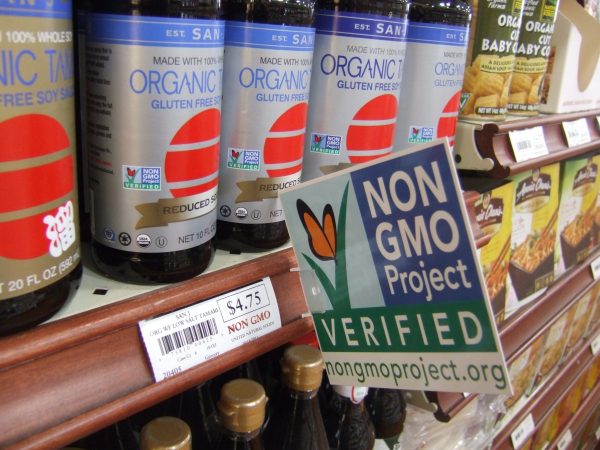Butterfly logo likely to gain increased importance with introduction of problematic new GMO labeling law
In less than 20 years, the Non-GMO Project has grown from being a grassroots campaign started by a natural food store employee to the leading non-GMO verification program in the U.S. with product sales topping $40 billion.
Case study in successful grassroots action
The growth of the Non-GMO Project has been organic. In 2003, The Natural Grocery Co. in Berkeley, California and The Big Carrot in Toronto, Ontario, launched the “People Want to Know” campaign with the aim of organizing natural food retailers to persuade natural food companies to reveal the GMO status of their products. Growing to 161 natural food stores and cooperatives, the campaign became the Non-GMO Project in 2005, when FoodChain Global Advisors, an Iowa-based company with expertise in GMO testing, was asked to provide technical assistance to verify the non-GMO status of products. (The Organic & Non-GMO Report played a role in connecting FoodChain to the Non-GMO Project.)
The Project gained critical mass in 2007 with the involvement of Whole Foods Markets and United Natural Foods, as well as participation from a growing number of organic food manufacturers, including Straus Family Creamery, Eden Foods, Nature’s Path, and Lundberg Family Farms. Leaders of these companies were concerned about the incursion of GMOs into organic foods. The Non-GMO Project was officially launched in 2007 along with a standard for non-GMO verification.
Non-GMO Project standard
The Non-GMO Project standard was developed with input from members of the natural and organic food industries. The standard has requirements for segregation, testing, and traceability, among other protocols. The types of products that can receive Non-GMO Project verification include planting seed, grains, food ingredients, food products including pet foods, personal care products, vitamins and supplements, livestock feed and supplements. The Project’s action thresholds or GMO tolerances are 0.25% for seed, 0.9% for food products and supplements, 5% for livestock, poultry, and seafood feed, and 1.5% for non-food items such as cleaning supplies and clothing and textiles.
Since launching in 2007, the Non-GMO Project has become the de facto non-GMO standard in the U.S. because the U.S. government has not developed a national non-GMO standard.
According to a 2020 survey by Linkage Research, Non-GMO Project Verified and USDA Organic are by far the most recognizable and most sought-after certifications on food products in the U.S.
Non-GMO Project growth
In just 15 years, sales of Non-GMO Project Verified products have grown to $40 billion per year. There are 100,000 Non-GMO Project Verified products from 3,100 brands. About 45% of the verified products are also certified organic.
Since the COVID-19 pandemic began, sales of Non-GMO Project Verified products have grown by 15% as consumers associate non-GMO as a healthier food choice. Prior to the pandemic, Non-GMO Project Verified product sales were 5%-10% per year.
According to Has Eisenbeis, communications director at the Non-GMO Project, products with both the Non-GMO Project butterfly seal and the USDA Organic logo have produced a 19% sales growth rate, which is higher than products containing just one of the seals.
“We believe that’s the gold standard if you’re trying to avoid GMOs and buying organic to avoid the pesticides, herbicides, and antibiotics,” Eisenbeis says.
The leading category of Non-GMO Project Verified products is refrigerated foods including milk, yogurt, eggs, meat products, and pasta. The second leading category is fresh produce—fruits and vegetables. Other leading categories of Non-GMO Project Verified products include snack foods, condiments, processed foods, and breads. Plant-based foods are a fast-growing trend, and non-GMO is seen as an essential attribute of such foods, according to research by Mintel.
Many mainstream U.S. food brands now have Non-GMO Project Verified products including Dannon yogurt, Gerber baby foods, Frito Lay snack products, Dole fruit juices, Barry Callebaut chocolate products, and more.
Increased importance with new GMO labeling law
The strong sales of Non-GMO Project Verified products shows that many American consumers have ongoing concerns about the risks of GM foods. A 2020 survey by the Pew Research Center found that about half of U.S. adults (51%) think GMOs are worse for people’s health than foods with no genetically modified ingredients. A 2018 study by the Hartman Group found that 46% of American consumers avoid GM foods and 42% of those are looking for products with the Non-GMO Project seal.
A new GMO labeling law, the National Bioengineered Food Disclosure Standard (NBFDS), went into effect at the beginning of this year. NBFDS will label foods containing GM ingredients as “Bioengineered.” The law is widely criticized for containing many loopholes. An estimated 70%-80% of processed foods in the U.S. contain GM ingredients but many of these won’t be subject to labeling if the GM ingredients aren’t detectable by testing. Problems with the law have led consumer advocates, led by the Center for Food Safety, to file a lawsuit to overturn it.
However, some industry experts think the law will benefit the Non-GMO Project.
“More companies will voluntarily label their products as not produced using bioengineering. If a company wants a certifiable label, I believe the Non-GMO Project is going to grow,” says Jane Kolodinsky, Chair of Community Development and Applied Economics at the University of Vermont.
The confusion over NBFDS could lead more consumers to seek out certified organic or Non-GMO Project Verified products, making those labels even more meaningful.
“At the end of the day, they will look for those ‘shortcuts to trust’ that third party certifications represent, so in that sense, the Non-GMO Project is well positioned to continue as the most meaningful and recognizable non-GMO certification,” Eisenbeis says.
The “Bioengineered” food label also doesn’t address the growing number of synthetic biology products on the market. The Non-GMO Project has been tracking these products and estimates there is a 400% growth in companies developing and using these new GMOs in the past five years. Syn-bio products are prohibited from receiving Non-GMO Project verification.









